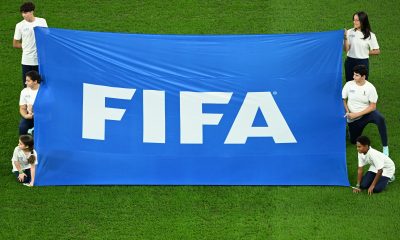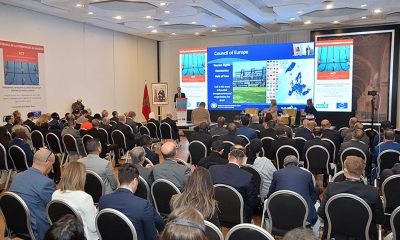
The commercial attractiveness of sports events has never been more alive.
With the passage of time, the value of the sports industry, as a whole, continues to reach new heights.
Researchers have valued the global sports marked at nearly $388.3 billion (€343.3 billion) in 2020 which is an astronomical figure when one takes into account that many sport events were either cancelled/postponed or played behind closed doors owing to the COVID-19 restrictions imposed across the globe.
The market is expected to reach $599.9 billion (€530 billion) by 2025 and $826 billion (€730 billion) by 2030.
Major international sporting events such as the FIFA World Cup, the Olympic Games, the ICC Cricket World Cup, NBA Finals and the Rugby World Cup all contribute towards the overall commercial value of sport.
These sporting events captivate large global audiences and entice high-profile sponsorships and partnerships who fork out millions to have their brand associated with these competitions, some of them on an exclusive basis.
While major sporting events offer unparalleled platforms for companies and brands to gain global visibility, it is quite common to witness a number of companies and brands actively seeking to associate themselves with the goodwill of such events without securing any official sponsorship or commercial association rights, i.e., through what is often called ‘ambush’ or ‘guerrilla’ marketing.
Most approaches to maintaining the integrity of sponsor investments involve the implementation of rights protection programmes (RPP).
Such ‘programme’ is a systematic plan of action to protect the investment of the rights granted to the sponsors, partners and licensees of an event.
An RPP should ideally address, amongst others, broadcast and proprietary content, commercial abuse of an event’s intellectual property and ambush marketing campaigns. It is achieved via various stages.
First and foremost a sport event organiser needs to focus on the core rights; i.e. identify and prioritise the core properties of a sporting event, such as for example event marks (logos or trademarks), participating athlete images, match tickets and audio-visual content, all of which are important and valuable core properties of any sporting event.
Imagine using these examples without any form of consent/authorisation – what would happen? It would surely have a negative effect on the value of such sporting event. The use of an effective RPP helps protect against the unlicensed use of event marks and athlete images, counterfeit merchandising, match tickets available on the black market and online piracy.
The sport event organisers should ensure that contractual relations are entered into as early as possible with key parties such as hosts, broadcasters, partners, media, teams, players and local authorities.
For both the Olympic Games and FIFA World Cup, the respective organisers bound the host nation/s to enact specific local legislation that offers protection to the event and its sponsors.
Such contracts should be entered into as early as possible in order to pre-empt many of the risks associated with rights’ abuses and severely avoid the risk of ambush marketing.
An effective RPP campaign should seek to communicate to the public, especially the commercial community, the properties in which the event organiser seeks to enforce its rights and the legal provisions that back the event owner’s claims.
This can be achieved by undertaking a comprehensive public education and advance notification campaign.
Such programmes may primarily target the host territories as well as on a global scale. Public education measures should be undertaken well in advance of a particular sporting event taking place in order to be most effective.
A key factor to protect the value of a sport event is having effective monitoring and enforcement strategy.
Comprehensive online, off-line and on-ground monitoring and enforcement helps secure the exclusivities that have been promised to sponsors.
It is advisable that the monitoring of potential infringements starts well before the commencement of the event; such as the sale of match tickets on the black market, unlicensed hospitality packages and non-licensed promotions making use of the events properties. Collaboration with local authorities such as the local police force is also key.
Finally, sport event organisers should be prepared.
Those wishing to ambush sporting events are often innovative and strategic in their actions with ambushers aiming to exploit the limitations and weaknesses in law and enforcement structures.
Ambushing tactics
Ambush marketing is now shifting from a physical presence to a more online presence.
As a result, sport event owners must be constantly prepared for new and unusual ambushing tactics by exercising constant vigilance and not letting the guard down. It is of utmost importance that sport event organisers ensure that they are kept abreast with the latest technological developments as well as social media platform developments and trends.
When conducting a RPP, there is a need to try and achieve a right balance; on the one-hand offering the adequate protection that sponsors and brands expect whilst at the same time ensuring that the major sporting events continue to achieve positive outcomes for those who form part of it; whether athletes or spectators.
An RPP should be thoughtful, balanced and responsibly managed.

World Cup News
-
FIFA World Cup
/ 1 month agoSon scores but Thailand hold South Korea in World Cup qualifier
Son Heung-min scored but South Korea were held 1-1 at home by Thailand in...
By AFP -
FIFA World Cup
/ 2 months agoJapan-N. Korea World Cup game to stay in Pyongyang, JFA says
Japan’s World Cup qualifier against North Korea will be played in Pyongyang as planned...
By AFP -
FIFA World Cup
/ 2 months agoGerman ex-FA bosses on trial over World Cup tax evasion
Three German ex-top football officials went on trial on Monday in a 13.7-million-euro ($14.8...
By AFP -
FIFA World Cup
/ 2 months agoSaudi Arabia formally launches bid for 2034 World Cup
Saudi Arabia formally launched its bid to host the 2034 World Cup on Friday,...
By AFP

English Premier League
Watch: Man. City crush Brighton to close gap on Arsenal in title race

English Premier League
Slot ‘confident’ of Liverpool job as ‘negotiations’ take place

More sports
Boris Becker discharged from bankruptcy: lawyer

BOV Premier League
Tickets selling fast for Floriana vs Ħamrun Spartans ‘title decider’

Winter Olympics
Watch: Geisenberger wins sixth Olympic medal to tie luge record




































